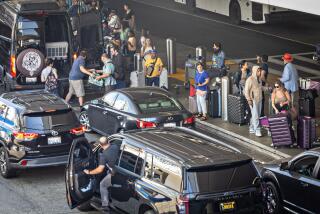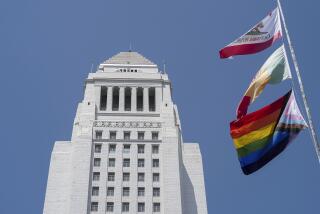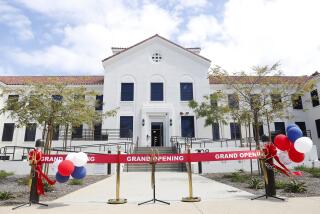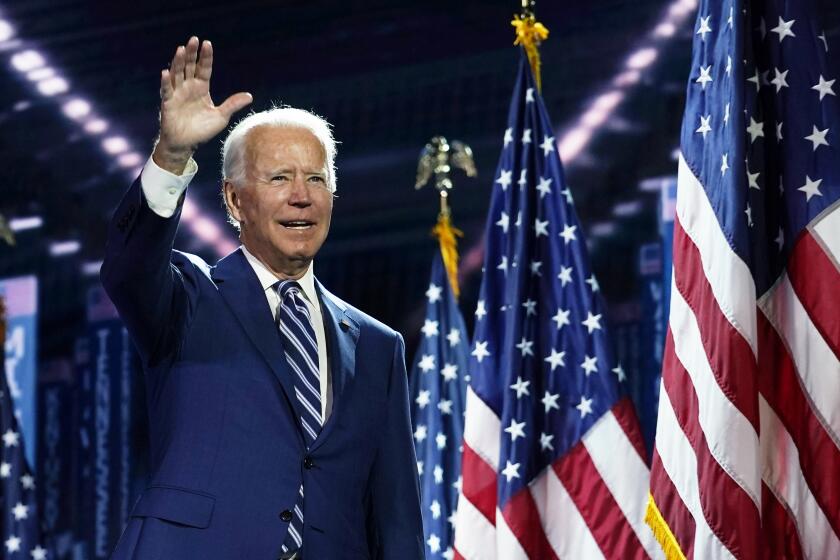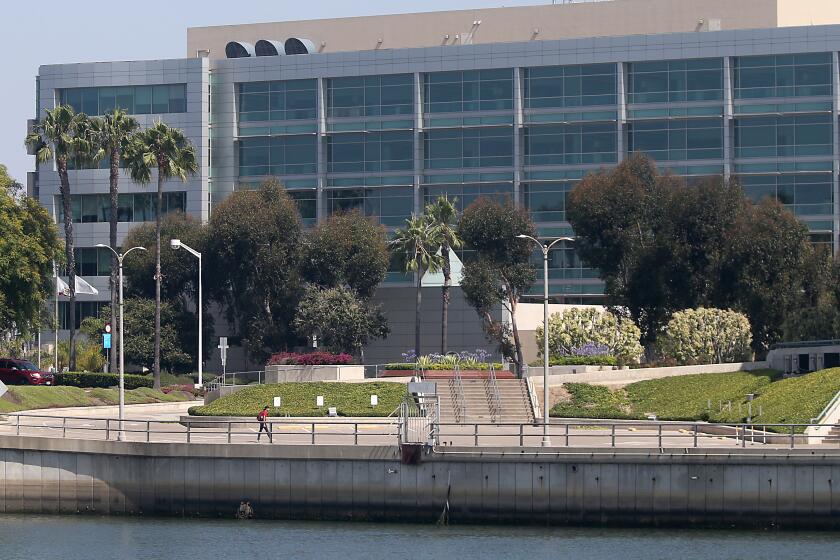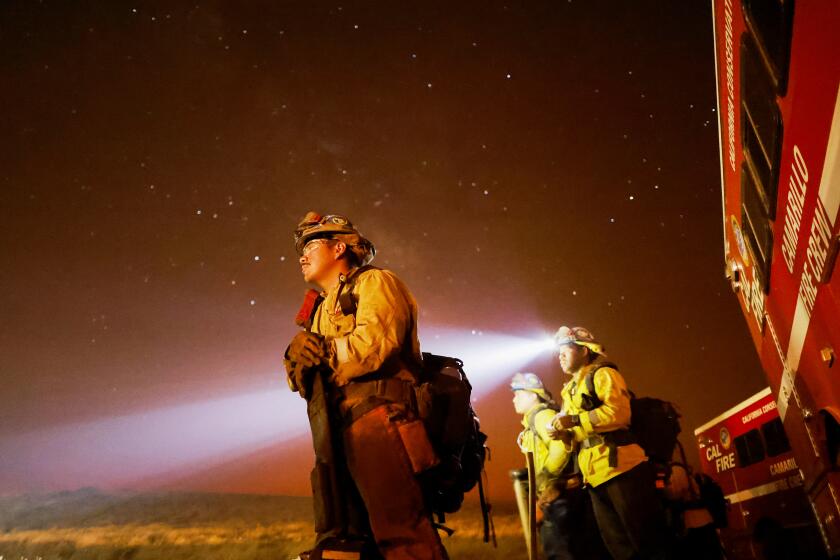LOCAL ELECTIONS / 30TH CONGRESSIONAL DISTRICT : Replacing Roybal: Key Race for Latinos
To borrow a line from Ronald Reagan, the free-for-all primary among 10 Democrats in the 30th Congressional District is “the big casino.”
Reagan used the casino characterization to describe the winner-take-all prize of 167 Republican delegates in the 1976 GOP California presidential primary. The stakes are also high in the 30th District: Most observers consider the race to succeed veteran Democratic Rep. Edward R. Roybal in Congress to be the most important race for Latinos in Los Angeles this year.
At stake is the chance to carry on the legacy of Roybal, the 75-year patriarch of Latino politicians in Los Angeles who leaves a high-profile, liberal record of fighting for better health care, additional benefits for senior citizens and “amnesty” for qualified illegal immigrants. It is a record that the field of 10 hopefuls think they can improve upon.
The race also is a classic matchup between the two major Latino camps in Los Angeles-area politics. Roybal, Los Angeles County Supervisor Gloria Molina and their allies have lined up behind freshman Assemblyman Xavier Becerra of Monterey Park. Supporters of Los Angeles City Councilman Richard Alatorre and state Sen. Art Torres (D-Los Angeles) are working for the election of Los Angeles school board member Leticia Quezada.
Like the bitter 1991 supervisorial race between Molina and Torres, the fight has split loyalties among Latino activists who consider both Becerra and Quezada friends.
“This is the important race for Latinos in Los Angeles,” said politics and media consultant Richard Yanez, who has kept a close eye on the campaign. “I have friends working for both Becerra and Quezada and I think having opposing camps is a healthy thing.”
With Democrats holding a 60%-26% edge in party registration, the winner of the June 2 primary figures to have the inside track to assume the seat.
The seat’s significance became evident in February, just days after the congressman announced he would step down.
Initially, Roybal backed his longtime chief aide, Henry Lozano, to succeed him. Two weeks after Lozano said he would seek the seat, however, he abruptly reversed field and decided not to run, citing family considerations.
That set off a harried search for another suitable candidate that the congressman and Molina could support. Eventually, Becerra, who was completing his first term in his San Gabriel Valley-based Assembly district, decided to enter the race.
Meanwhile, Quezada, a former Los Angeles Community College trustee who has spent the last five years on the Los Angeles school board, got the support of Alatorre and Torres after she entered the race.
The early maneuvering prompted Quezada to call Becerra an “outsider” to the 30th District and Becerra to talk of “dark clouds,” a veiled reference to Quezada’s supporters who might sling mud at him.
It also left the other hopefuls to go after Becerra and Quezada as “machine-backed career politicians.” Quezada, 38, has been criticized for driving her school board-supplied car for campaign-related work, although she said she pays $89 a month for its use on personal time. And Becerra, who is 34, has been attacked as being too young and inexperienced.
The eight others in the Democratic primary are lawyer Albert C. Lum, 58; Jeff J. Penichet, 46, owner of a firm that produces bilingual education material; businesswoman Helen Hernandez, 44; hospital administrator Roland R. Mora, 54; marketing and legislation consultant Ysidro Sid Molina, 57; public school teacher Gonzalo Molina, 66; city electrical worker Esca W. Smith, 36, and Mark Calney, 41.
The two Molinas are not related to each other or to Supervisor Molina.
Dr. Morry Waksberg, 45, a Beverly Hills physician, is running unopposed in the Republican primary.
With congressional boundaries affected by reapportionment and seven new districts that California picked up because of the 1990 Census, the 30th Congressional District retained the largely Latino communities of Lincoln Heights, Boyle Heights and El Sereno--integral parts of Roybal’s old 25th District.
Added were the Latino immigrant neighborhoods of Echo Park, East Hollywood and Pico-Union as well as Eagle Rock and Silver Lake.
The district also includes the upscale homes of Mt. Washington and the noisy, congested streets of Koreatown, where some of the worst damage in the recent rioting occurred.
Latinos make up 61% of the 30th District’s 570,000 residents but only 34% of the 123,000 voters. Anglos are 55% of the voters, Asian-Americans 7% and African-Americans 4%.
According to most of the Democratic hopefuls, the destruction in the western part of the district, brought on by the not guilty verdicts in the Rodney G. King case, has taken momentum out of the race.
Campaigning came to a halt during the height of the unrest, creating a variety of problems. Quezada, for example, scrambled to have a mailer sent out by a post office in Van Nuys when it became clear that going to the main post office in South Los Angeles was unsafe.
The destruction made some of the candidates pause and take time to reflect on the campaign.
Hernandez said she was forced to shut down her Silver Lake campaign office at the height of the rioting and looting on April 30 and drove into the Hollywood Hills to get away from the danger.
“I can’t even begin to tell you the feelings that I had at looking at our city under siege,” she said. Several days later at her headquarters, Hernandez pinned up a South Korean flag--given to her by the family of a Korean youth killed in the unrest--next to a U.S. flag in a window overlooking Sunset Boulevard.
Other candidates, including Lum and Becerra, have redoubled their efforts in the affected areas to figure out what could be done for the residents.
“Actually,” admitted one candidate who asked that his name not be used, “I felt a little guilty asking for these folks’ vote. I want to help them but I also felt a little weird knocking on their door. Perhaps the election is at the wrong time for them. Maybe they need to think over things.”
In the wake of the unrest, Lum sent to voters an “official home protection guide,” listing ways of making a residence more secure. The candidates are in step on most issues, agreeing that crime, the creation of more jobs, better health care and enhanced educational programs are the most critical issues facing the diverse district. Virtually all of them favor a woman’s right to have an abortion.
And except for Becerra, they favor term limits for members of Congress.
But the common ground among them quickly dissolves when the talk turns to who is the best-qualified Democrat.
Becerra, although he is supported by Roybal and Molina, says he is an underdog in the race because he is being outspent almost 3-to-2 by Lum and Penichet. A former state deputy attorney general, Becerra has emphasized his fight against the proposed state prison near Boyle Heights and the aerial spraying of malathion and the need for effective campaign fund-raising reform.
Quezada, who lives in Highland Park, touts her experience on the school board and her support from the EMILY’s list, a national financial supporter of women candidates, as indicators that she is a serious contender. Endorsed by feminist and author Gloria Steinem, Quezada never misses a chance to call herself the only “local elected official” in the race.
Lum has raised nearly $200,000 in an effort to capitalize on the anti-Capitol Hill feeling among voters. Plastering the district early on with placards, Lum has promised to serve only eight years in Congress if elected. He is endorsed by Los Angeles City Councilman Michael Woo, state Insurance Commissioner John Garamendi and Los Angeles City Atty. James Hahn.
Penichet, who was born in Mexico City and speaks fluent Spanish, has lent himself $200,000 for the race. In addition to vowing not to accept money from political action committees, he has built his anti-incumbent campaign around the abuses on Capitol Hill and has come up with the campaign’s best gimmick--an eight-minute videotape sent to 10,000 voters.
Hernandez also calls herself a feminist candidate, noting that she has the endorsement of the political action committee of the National Organization for Women. A former vice president of public affairs for Columbia Pictures Television, the mother of three grown children stresses her background in the business world. She is endorsed by, among others, Dolores Huerta, a ranking official with the United Farm Workers union.
Mora, an openly gay candidate, has the endorsement of some veterans affairs officials. A deputy assistant secretary of Labor during the Carter Administration, the former Marine captain says his experience as a hospital administrator would be invaluable in the fight for more AIDS research and for universal health care. He is endorsed by actor Robert Fuller.
Ysidro Sid Molina, who once worked as an aide to then-Eastside Councilman Arthur K. Snyder, helped develop the forerunner of today’s dial-a-ride program during his years working on the Eastside. He has an extensive record of work with labor unions and was a delegate to the Democratic National Convention in Chicago in 1968.
Gonzalo Molina, who has taught for nearly 30 years in Los Angeles public schools, has run for public office several times before, including a run against county Supervisor Edmund Edelman two years ago in which he received 41,000 votes. Over the years, he has helped more than 1,000 people learn English as part of qualifying for citizenship, he said.
Congressional District 30
Overview: Most observers consider this race, to succeed retiring Democratic Rep. Edward R. Roybal, the most important race for Latinos in Los Angeles this year. The race also is a classic matchup between the Los Angeles area’s two major Latino camps.
Where: Under reapportionment, the 30th District retained the largely Latino communities of Lincoln Heights, Boyle Heights and El Sereno--integral parts of Roybal’s old 25th District. Added were the Latino immigrant neighborhoods of Echo Park, East Hollywood and Pico-Union, as well as Eagle Rock and Silver Lake.
Demographics
Anglo: 15%
Latino: 61%
Black: 4%
Asian: 20%
Party Registration
Dem.: 60%
GOP: 26%
Others: 14%
Candidates:
DEMOCRAT
* Gonzalo Molina: Public school teacher
* Jeff J. Penichet: Educator, business owner
* Helen Hernandez: Businesswoman, marketing executive
* Xavier Becerra: State assemblyman
* Esca W. Smith: City electrical worker
* Albert C. Lum: Attorney/arbitrator
* Leticia Quezada: Los Angeles Unified school board trustee
* Mark Calney
* Roland R. Mora: Hospital administrator
* Ysidro Sid Molina: Marketing/legislation consultant
REPUBLICAN
* Morry Waksberg: Physician
More to Read
Start your day right
Sign up for Essential California for news, features and recommendations from the L.A. Times and beyond in your inbox six days a week.
You may occasionally receive promotional content from the Los Angeles Times.
